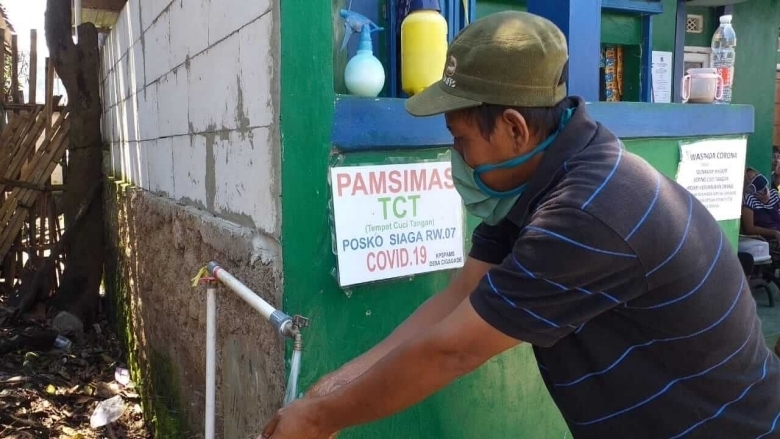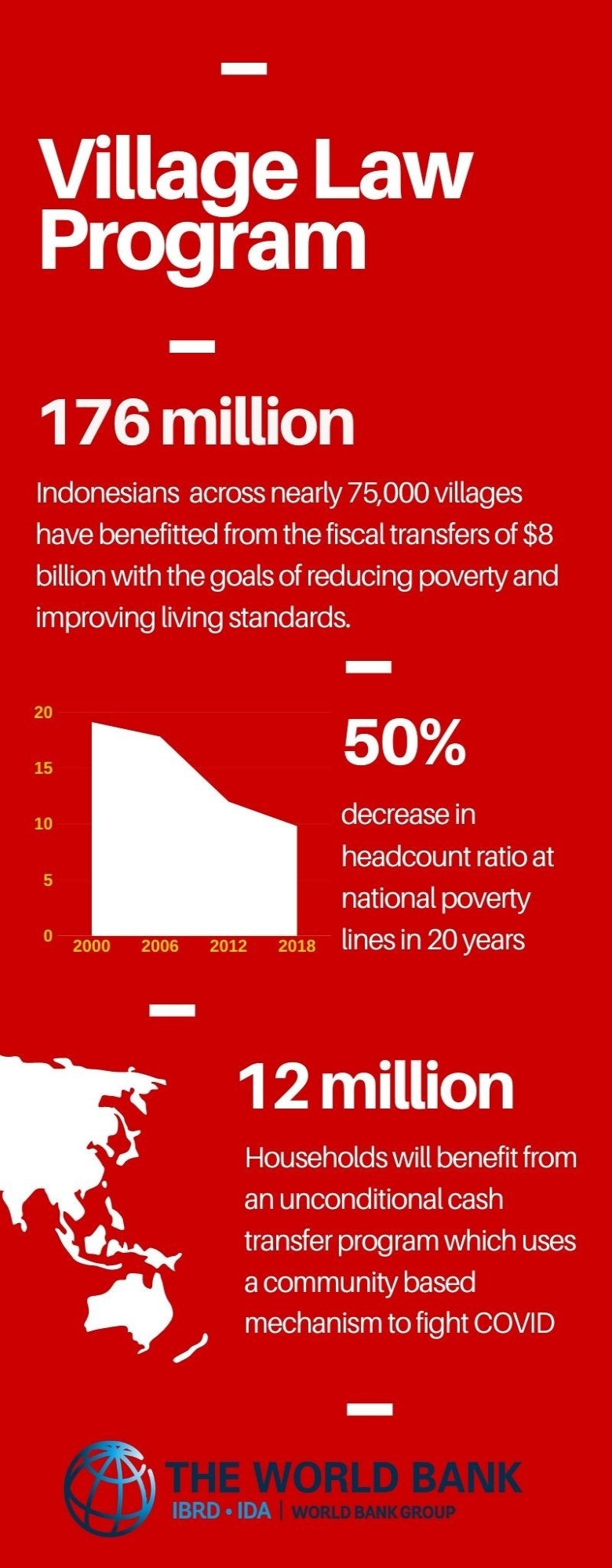Indonesia and COVID-19
Indonesia is the largest economy in Southeast Asia and has a 21-year history of CDD approaches such as the Kecamatan Development Project (KDP) and Program Nasional Permberdayaan Masyarakat (PNPM). In 2014, the CDD systems were institutionalized within the government under the Village Law, authorizing the transfer of funds to villages with the goals of reducing poverty and improving living standards through community-led development and empowerment. As a result, villages have increased budgets, autonomy, and authority to finance local infrastructure development, deliver basic services, and implement projects for the welfare of the community.
A diverse archipelago nation of more than 300 ethnic groups, Indonesia has made enormous gains in poverty reduction, cutting the poverty rate by more than half since 1999, to 9.4% in 2019.
Despite the progress, significant challenges in achieving Indonesia’s development goals remain. Out of a population of around 267 million, about 25.1 million still live below the poverty line. Based on March 2019 data, around one fifth of the entire population remains susceptible to falling into poverty.
As Indonesia was continuing to face these challenges, the COVID-19 pandemic hit, introducing several challenges. For one, the urban areas are likely to have experienced increased unemployment that might have resulted in mass movements to rural areas that coincided with the Eid holiday. This could lead to the spread of the virus and a double impact on the rural economy. The rural areas also face reduced remittances from urban areas, given the migration. Then you have the loss of basic services that lead to poor health, education, maternal mortality, and stunting.
To respond to the many acute challenges of the COVID-19 pandemic, the government of Indonesia turned to well established operational programs to rapidly address the most acute needs. In cooperation with the government, World Bank is supporting the Institutional Strengthening for Improved Village Service Delivery project, which has been adapted to mitigate the socio-economic impacts of the COVID-19 pandemic and help minimize the spread of the virus.
The World Bank’s social development team is supporting the government to improve the implementation of Village Law. This support will help improve the effectiveness in spending nearly $8 billion in fiscal transfers to villages, across 74,954 villages that reach nearly 176 million Indonesians. The use of these systems to respond to the COVID-19 pandemic is a key priority in partnership with the government.
Today, villages are adapting to meet the social demands brought on by COVID-19. The response aims to use village funds to provide income support, health information, community targeting assistance to identify the “new poor” and vulnerable, and remote area monitoring. A new unconditional cash transfer program, which uses a community-based targeting mechanism, will reach an estimated 12 million households who otherwise would not have been reached.
In addition to funds, it also became clear that villages at the front lines need to be equipped with information and systems to leverage a community-based response. With fake information a tangible obstacle, there was no effective monitoring system in place and villages became overwhelmed. The government is also facing difficulty disseminating information about COVID-19 as guidance and programs rapidly change. To respond to some of these challenges, a new digital tool, the Villages Against COVID-19 application, is supporting villages at the frontlines. The app serves as a data collection and tracking tool for the villages to monitor health data, job loss, poverty and social assistance on a weekly and monthly basis. This will help to show trends, pinpoint outbreaks and help inform community responses.
To address the challenges around unemployment, this program is also supporting an expanded cash for work scheme alongside infrastructure investments like local roads, water points, and buildings. Village funds will also continue to support local investments and service delivery, such as sanitizing public spaces, supporting local isolation spaces, supporting distribution of masks, and ensuring the continued health and education services at the frontline.
To address the urban challenges around COVID-19, the Indonesia National Slum Upgrading Program (NSUP), which targets 6,000 slums through primary infrastructure and community infrastructure grants, has also been adapted. This project builds on more than two decades of experience of CDD in urban areas through the Urban Poverty Project and the National Community Empowerment Program in Urban Area (PNPM - Urban), including a network of about 11,000 community institutions on the ground. To date, the project is implementing “labor intensive works,” creating 1.2 million workdays of employment and helping over 1 million in 400 of the poorest communities. The remaining project resources are being reallocated in response to COVID-19, which will help generate an additional 2 million workdays, expanding the water, sanitation, and hygiene agenda, and creating productive infrastructure assets.
In the NSUP, decision making will be made at communities and new ICT-based approaches will strengthen monitoring systems to better remotely track the effectiveness of cash for works programs; and assess COVID19 social and economic impacts in urban areas. This can help inform decisions on localized outbreaks and allow for a quick response.
These are some of the ways the World Bank is adapting community driven development programs to help Indonesia respond to COVID-19. They are not only playing a critical role in this initial stage of response, but also laying the groundwork for a stronger and more resilient future.


